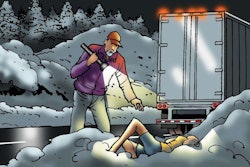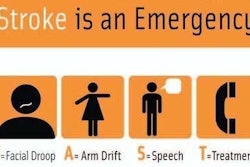
Most drivers have an accident kit in the truck. It generally contains a disposable camera and all of the paperwork needed to take care of the truck, should there be a problem. This is all fine and well, assuming the driver is able to retrieve the kit and use it, but what happens when the driver is incapacitated? What happens when the first responders show up and there’s no one to give them information regarding the driver or the load? How would you handle an emergency such as heart attack or stroke symptoms on the road?
Former first responder Homer Lee worked as an EMT in Georgetown County, S.C., for 10 years. He gives some insight on some of the concerns first responders have when a commercial vehicle is involved in an accident.
“As EMTs we’re trained if the driver is unable to give verbal confirmation of their load,” he says, “to find the manifest and verify the safety of the area, to know if we need to immediately evacuate the victim and contain the area with a hazmat crew. Our main concern upon arrival is what the cargo is and the safety of the general area around it.”

In addition to placards, federal law requires hazmat carriers to have a manifest in the driver’s side door or on the dashboard, and these are the first two places emergency personnel look for information. Says Lee, “If the driver has a medical issue or concern, having a list of their medications and conditions in with the manifest is always a good idea.”
Dr. Phillip McGuire has worked emergency medicine at Holy Spirit Hospital in Harrisburg, Penn., for the past 30 years. He has a couple of requests from emergency medical personnel for making the job of emergency care easier and more effective.
1) “Always have a list of current medications and allergies in your wallet. We can figure out your medical problems from the meds you take. There’s no need to know your blood type – it is always typed and cross matched prior to any transfusion.”
2) “If you have a pacemaker or and AICD, keep the make and model card in your wallet so the device can be interrogated when needed.”
When it comes to emergencies not involving accidents, Dr. McGuire has this to say: “If you experience chest pain, take a full 325 milligrams of aspirin and call 911. Do not attempt drive yourself to the hospital. Do not attempt to drive yourself to the hospital if you develop stroke symptoms. Call 911. We can open clogged brain arteries if the onset of your symptoms are recent (3-4 hours). DO NOT take aspirin for stroke symptoms, as sometimes they are a result of a hemorrhage.”
A medical alert ID bracelet or necklace is a good way to provide correct medical information if you’re incapacitated and unable to respond. Having an ICE (in case of emergency) contact listed in your cell phone can assist in notifying family members and gathering vital information regarding health status. Find ICE apps for Apple and Android phones via those links.
Today’s technology provides the ability to have patient information almost instantly and preparing for an accident can make it that much easier to survive one. Taking a extra few minutes ahead of the trip to prepare a packet, load an ap, or put on an ID bracelet can the difference between life and death in an emergency situation. The most important piece of equipment you have is you. Take care of it!










